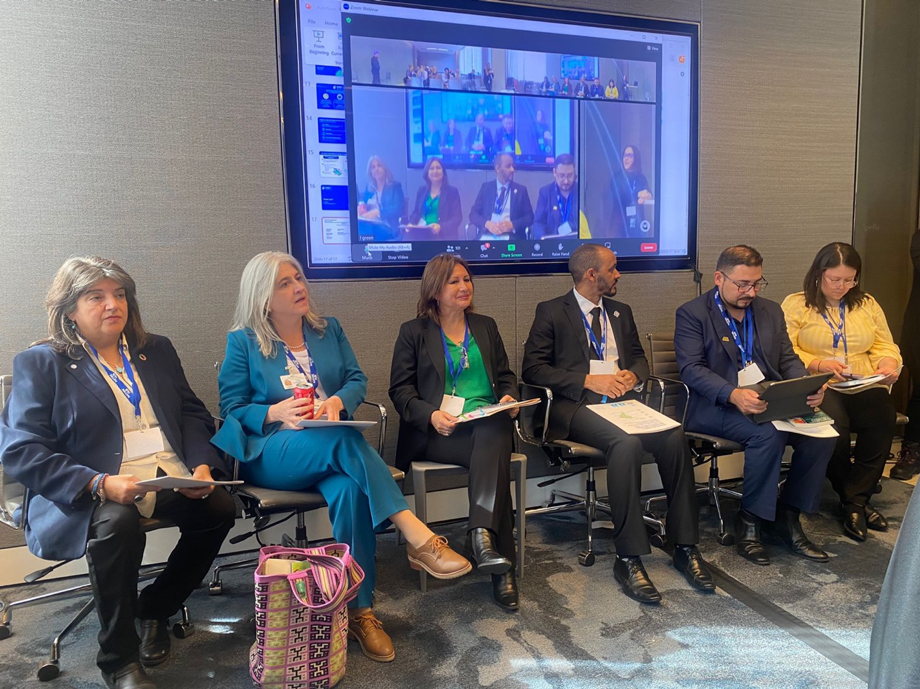Review the details of the Network and Observatory for Water Sustainability session at the United Nations Water Conference
Work area(s)
Topic(s)
This week, ECLAC co-organized, together with the Ministry of Housing, City and Territory of Colombia, the side event "Network and Observatory for Water Sustainability (ROSA): promoting the Regional Water Action Agenda for Latin America and the Caribbean”. This was presented during the United Nations Water Conference 2023, currently taking place in New York.

On the past Wednesday March 22, the side event "Network and Observatory for Water Sustainability (Red y Observatorio para la Sostenibilidad del Agua, ROSA): promoting the Regional Water Action Agenda in Latin America and the Caribbean” was held. The event took place during the first day of the United Nations Water Conference, in New York. Its objective was to present the Regional Water Action Agenda for Latin America and the Caribbean, together with the consolidation of the Regional Water Network and Observatory (ROSA).
The event was organized jointly by the Ministry of Housing, the City and Territory of Colombia and ECLAC. In this way, Mrs. Catalina Velasco, Minister of Housing of Colombia, opened the event, offering a message of collaboration. She was followed by Ms. Jeannette Sánchez, Director of ECLAC's Natural Resources Division, indicating the importance of having this type of forum for meetings and action. She also highlighted the substantive nature of the ROSA project, of having information and being able to account for the situation in drinking water and sanitation, and thereby support decision-making in the countries of the region.
The opening was followed by a brief presentation of the ROSA Project, led by Ms. Rayén Quiroga, economic affairs officer of ECLAC's Natural Resources Division. Thus, she mentioned that in addition to forming a Regional Water Sustainability Network, for the exchange of good practices, information, data and evidence, an Observatory for Water Sustainability will be established, a digital repository with policy documents and information. In addition, technical assistance programs will be carried out with pilot countries, which will then go on to form a guide and a training course, available online.
Then, there was a ministerial round table, where each panelist commented on the main water challenge in their country, as well as the actions they are taking to face it in the short, medium, and long term.
From Colombia, Mrs. Catalina Velasco, Minister of Housing, City and Territory, indicated that they have an institutional challenge of coordination between actors, as well as having a lack of information regarding their water operators. They would like support mapping how many there are, where they are located, what their challenges are, and where the gaps are. The presentation generated reactions from El Salvador, Peru (online) and the Dominican Republic regarding different information mapping systems developed in their respective countries.
From Bolivia, Ms. Marissa Castro, General Director of International Boundaries, Borders and Waters, representing the Vice Minister of Soils and Waters, mentioned the relevance of developing networks between countries. In Bolivia, one of the main challenges is to strengthen the technical capacities of local cooperatives. Here, it can be beneficial to share experiences and be able to learn from other countries.
Mr. Juan Saldaña, Director of the National Institute of Hydraulic Resources (INDRH) of the Dominican Republic, participated on behalf of the Minister of Environment and Natural Resources, Miguel Ceara Hatton. He highlighted the lack of investment in hydraulic infrastructure, both in drinking water and in sanitation; and the need for education on the subject, from elementary schools to universities.
Finally, Mr. Jorge Castaneda, President of the Salvadoran Water Authority (ASA), represented Mr. Fernando López, Minister of the Environment and Natural Resources of El Salvador. He presented the country's needs to adopt georeferential technologies and artificial intelligence, as well as implement business analytics in drinking water and sanitation services.
To comment on the project and the round table, Alejandra Aguilar, from the Latin American Youth Coalition for Water, presented first. She pointed out that as a coalition, they see great potential to engage the creative and innovative outlook of young people in this project, especially students. This, through formalizing intergenerational processes and with the communities. A second look was given by Ms. Candelaria Lucero, WaterAid's Director of Programs for Colombia. She marked the importance that local communities were involved, as they are the ones currently suffering from lack of access.
For the closing remark, Ms. Quiroga and Ms. Sánchez, in representation of ECLAC, thanked the attendees for their participation and the countries' commitment to this project.
For more information about the panels and exhibitors, you can download the event’s agenda here. Also, in the following link you can find the complete video of the session.